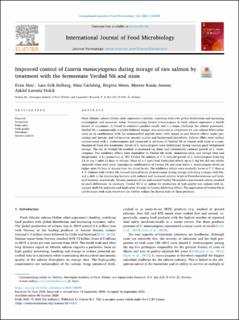| dc.description.abstract | Fresh Atlantic salmon (Salmo salar) represents a healthy, nutritious food with global distribution and increasing consumption and economic value. Contaminating Listeria monocytogenes in fresh salmon represents a health hazard to consumers, is linked to extensive product recalls and is a major challenge for salmon processors. Verdad N6, a commercially available buffered vinegar, was evaluated as a treatment for raw salmon fillets either alone or in combination with the antimicrobial peptide nisin, with regard to anti-listerial effects under processing and storage, and influence on sensory quality and background microbiota. Salmon fillets were surface contaminated with L. monocytogenes and immersed in solutions of Verdad N6 or treated with nisin or a combination of these two treatments. Levels of L. monocytogenes were determined during vacuum-pack refrigerated storage. The use of Verdad N6 resulted in increased lag times and substantially reduced growth of L. monocytogenes. The inhibitory effects were dependent on Verdad N6 levels, immersion time, and storage time and temperature. A 5 s immersion in 10% Verdad N6 solution at 4 °C reduced growth of L. monocytogenes from log 2.8 to log 1 after 12 days of storage. Nisin (0.2–1 ppm) had listericidal effects up to 1 log but did not inhibit regrowth when used alone. Appropriate combinations of Verdad N6 and nisin led to L. monocytogenes levels no higher after 12 days of storage than the initial levels. The inhibitory effects were markedly lower at 7 °C than at 4 °C. Salmon with Verdad N6 showed reduced levels of total counts during storage indicating a longer shelf-life, and a shift in the dominating bacteria with reduced and increased relative levels of Enterobacteriaceae and lactic acid bacteria, respectively. Sensory analyses of raw and cooked Verdad N6 treated a non-treated salmon resulted in small differences. In summary, Verdad N6 is an option for production of high-quality raw salmon with increased shelf-life and enhanced food safety through its Listeria inhibiting effects. The application of Verdad N6 in combination with nisin treatment can further reduce the listeria-risks of these products. | |
